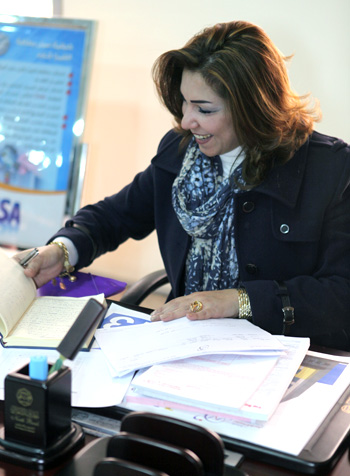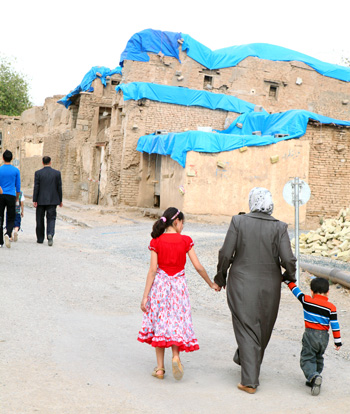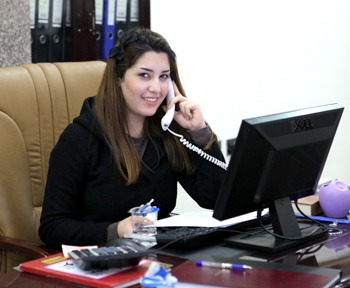Women’s Rights in Iraqi Kurdistan: Special Report
Kurdistan Top Stories
Report: Women’s Rights in Iraqi Kurdistan
While many areas retain the traditional female role and conservative gender practices in society, in some areas of Iraqi Kurdistan the role of women has changed, equal social treatment is more commonplace, and women are functioning in positions that were previously male dominated.

Report: Women’s Rights in Iraqi Kurdistan
Written by Christen Buckley
The growing acceptance of gender equality in Iraqi Kurdistan is a cultural transformation that portends future growth within the region and generates some degree of cultural distance between the Kurdish population in Iraq and the general Iraqi population. While many areas retain the traditional female role and conservative gender practices in society, in some areas of Iraqi Kurdistan the role of women has changed, equal social treatment is more commonplace, and women are functioning in positions that were previously male dominated. The improvement of the education system, the political mandates that protect women’s rights, the recent economic growth in Kurdistan, and the social ramifications of the past violence in Iraqi Kurdistan, have all influenced the spread of women’s rights in Kurdistan. The implications of this change in Kurdistan are promising for the further growth of the nation as women are more able to contribute to the development and growth of the region, thus utilizing a previously untapped sector of the population.
Traditional Gender Practices in Kurdistan (Iraq) and Regional Differences
Like many rural areas throughout Iraq, most women residing in rural Kurdistan are more likely to practice more traditional tribal positions within the gender hierarchy and remain removed from societal positions of power and innovation. This factor is compounded by the presence of conservative Islam or strict rural tribal practices in these regions. The most dangerous of the more traditional tribal practices include the acceptance of “honor killings” of women that are deemed to have “dishonored” their families. The effects of years of foreign occupation and the years of oppression under Saddam Hussein’s rule, weakened the social system’s ability to develop and by the lack of infrastructure and educational opportunities in many remote or less metropolitan areas. This factor could also contribute to the retaining of a traditional perspective of the role of women in society. In some areas of Kurdistan, both rural and urban, the role of women in society remains consistent with the rest of Iraq, despite the cultural and religious differences between the Kurdish population in Iraq and the general Iraqi population. There are however, signs of modernization and the development of the role of women in Kurdish society. Economic opportunities, political awareness, educational developments, and the response of Kurdish women to societal challenges are all contributing to the alteration of the role of women in Kurdish society.
The Effect of Economy, Politics and Education on the Development of Women’s Rights in Kurdistan (Iraq)
Unlike the rest of Iraq, in some more urban areas of Iraq, citizens are embracing a more modern role for women in society. Many flagships of the growing Kurdish economy are lead by females and women are increasingly likely to hold positions of power, as shown by women such as Bayan Sami Abdul Rahman, the Kurdistan Regional Government’s High Representative to the United Kingdom.
The years of genocide and oppression forced women in the Kurdistan region to rise out of their traditional roles as a necessity. In the wake of the death and destruction of oppression, women became responsible for their own survival, the survival of their families, and the survival of their people.
Awareness about the practice of “honor killings” and self immolation are spreading through organizations like “The Kurdish Women’s Rights Watch” and the “Kurdish Women: Action against Honor Killings.” The Kurdistan Parliament boasts the largest body of female lawmakers as they dedicate 30% of parliamentary seats to female representatives, while the Iraqi Parliament dedicates 25% of parliamentary seats to females.
In addition to these cultural and political shifts, Kurdistan is developing its educational system at a rapid pace, which will spread the practices of equality as education becomes available to all. According to Dr. Mohammed R. Mochtar, the Vice President for Administration and Finance Affairs at Salahaddin University, Kurdistan’s public education system and higher education system is expanding rapidly. This expansion is due to foreign support of Kurdish students, the creation of new colleges, the opening of the Public University, the opening of the first international school in 2006, and state funded education programs:
“All our needs being provided by the Government of Kurdistan, we need the private sectors to cooperate in helping some of the process, here in Kurdistan even the students get free dormitories to live in and $150 a month for all the students, this helps continued after graduation until the hiring them by the government or finding the job with the companies local or International, in fact all the students in the universities of Kurdistan, get the same kind of help, unlike any other countries in the world, which no free help is provided.”
This type of development in education will most likely spread the practices of gender equality as education becomes more available for all Kurdish citizens. The development of education goes hand in hand with the development of religion and culture and the changing interpretations and practice of Islam and tribal traditions will also contribute to the distance from traditional female gender roles.
As a result of the combined presence of economic development, political mandates that protect the rights of women, and the increasing opportunities for education, the role of women is changing in Kurdistan.  The growing presence of women’s rights in select areas of Kurdistan suggests that the region is developing new gender perspectives that will fuel further cultural and economic development in the territory as women are increasingly allowed to contribute to the societal and economic growth of Kurdistan.
The growing presence of women’s rights in select areas of Kurdistan suggests that the region is developing new gender perspectives that will fuel further cultural and economic development in the territory as women are increasingly allowed to contribute to the societal and economic growth of Kurdistan.
Societal Challenges Alter the Traditional Gender Roles in the Kurdistan Region of Iraq
This societal shift in some regions of Kurdistan could be attributed to several factors. Kurdistan reached a level of stability before the rest of Iraq as a result of the protection provided by the United States in the 1990’s. This Western presence could have contributed to the embrace of the concept of gender equality. The economic boom that Kurdistan is beginning to experience as a result of this stability and their natural economic resources could also encourage the acceptance of women in positions of power as numerous positions in the economy are developing and need to be filled.
Lastly, the very oppression and violence that prevented growth and development in Kurdistan that limited the opportunities for women, could also have acted as a catalyst for the beginning of this cultural shift.
The years of genocide and oppression forced women in the Kurdistan region to rise out of their traditional roles as a necessity. In the wake of the death and destruction of oppression, women became responsible for their own survival, the survival of their families, and the survival of their people. The nationalist, or tribal, loyalty that emerged from the oppression experienced by the Kurds began to surpass dedication to religious dogmas, such as those that restrict the activities of females in society. The Kurdish people are mostly Sunni Muslims, but Shi’ite, Jewish and Christian minorities have been present in the Kurdistan region for thousands of years. A broad sense of nationalism to the Kurdish people and loyalty to certain tribes, which often incorporated loyalty to tribal practices, often outweighed strict religious loyalties. Like many other women across the globe, some women in Iraqi Kurdistan responded to the oppression of their people by forming organized all-female militia, entirely breaking from the traditional female role to protect their lives and honor those loyalties.
In northern Iraq, in the city of Sulaymaniyah, an all female peshmerga, meaning those who face death, formed after the Kurdish uprising in 1991. This academy was funded and armed by the Patriotic Union of Kurdistan.  Previously, Kurdish women accompanied their husbands and supported rogue militias with food and resources. The women of Sulaymaniyah peshmerga were trained in warfare tactics and weaponry and awaited the invasion of the United States in order to take revenge on the Iraqi powers responsible for the death and disappearance of their loved one. After years after being subjected to years of violence and oppression, women in the area of Sulaimaniyah became trained combatants despite the social constraints found during peacetime. Similar cases of all female insurgent groups have been found in the Sri Lankan Liberation Tigers of Tamil Eelam, in the Ugandan Lord’s Resistance Army and in the Nepalese Maoist Army/People’s Liberation Front, where women broke away from the peacetime societal rules in order to defend themselves and their homeland. The presence of an all female peshmerga in Kurdistan signals the breaking of traditional gender roles in the region.
Previously, Kurdish women accompanied their husbands and supported rogue militias with food and resources. The women of Sulaymaniyah peshmerga were trained in warfare tactics and weaponry and awaited the invasion of the United States in order to take revenge on the Iraqi powers responsible for the death and disappearance of their loved one. After years after being subjected to years of violence and oppression, women in the area of Sulaimaniyah became trained combatants despite the social constraints found during peacetime. Similar cases of all female insurgent groups have been found in the Sri Lankan Liberation Tigers of Tamil Eelam, in the Ugandan Lord’s Resistance Army and in the Nepalese Maoist Army/People’s Liberation Front, where women broke away from the peacetime societal rules in order to defend themselves and their homeland. The presence of an all female peshmerga in Kurdistan signals the breaking of traditional gender roles in the region.
Sulaymaniyah was again brought to the forefront of women’s rights in Kurdistan during the violent division between the two government factions in Iraqi Kurdistan, the PUK and KDP. In 1994, women marched between Erbil and Sulaymaniyah to protest the divide between these two government factions and to demand reconciliation between the parties. The issue of women’s rights has since become part of both parties agendas. In both Erbil and in Sulaymaniyah, charities, aide centers, and and non-governmental organizations focused around the improvement of women’s rights are being formed to combat domestic violence and honor killings and promote the education of Kurdish women.
The transformation of the role of women in some areas of Kurdistan is the result of a combination of factors and circumstances. Kurdistan’s economic expansion, political advancement, education development, and the effects of civil unrest have all altered the cultural constraints regarding gender. While each of these elements separately may not have caused this shift towards more a more equality perspective towards women, the combination of there factors appear to be transforming the role of women in the Kurdish society in Iraq. In certain areas, more fundamental cultural opinions towards women are still commonplace. The future growth of the Kurdistan region, which is already fueled by the growing acceptance of gender equality, will most likely determine the future of women’s rights in Iraqi Kurdistan.